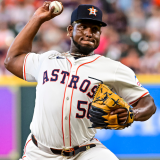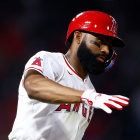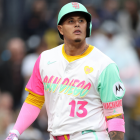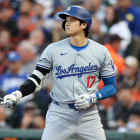Word is, Rangers superstar Josh Hamilton wants to be paid "like an elite player'' in his latest contract negotiations with the team, and that's no surprise since he is obviously an elite player. Especially at the moment.
But Hamilton is also a major gamble, an injury risk and a recovering addict. And that's all part of a very complex equation.
The Rangers seem to badly want to keep him, and that's understandable since he's easily the best player on a team of great players, and maybe the best in baseball. He's also the most popular player on a very popular team that's made the World Series two straight years and is an early favorite to make it three years in a row.
"I'm just so happy he's a Texas Ranger,'' manager Ron Washington told reporters after Hamilton's crazy-good, four-homer, one-double night in Baltimore.
I understand. But I'd advocate caution here.
It's easy to get caught in Hamilton's great moment, which also happens to be one of the great individual moments in American League history. As Danny Knobler of CBSSports.com pointed out, with Hamilton's historic four-homer game, he now has five homers and a double in his last six at-bats.
Hamilton is a legendary talent, no question about that. He is also a major risk.
The Rangers probably don't need my help deciding what to do about Josh Hamilton since they have been the one team that's been right about him so far.
The Rangers acquired him in a trade for Edinson Volquez, who was once pumped up as a Pedro Martinez-style pitcher but later only one of four players traded for Mat Latos, plus spare smallish reliever Daniel Herrera. They were right to hire someone to be his "life coach,'' to in effect have the job of keeping Hamilton out of trouble. (And word is, this is a fulltime job.).
The Reds medical staff, it turns out, was wrong to force a trade of Hamilton, who while averaging only 124 games a year in his four seasons in Texas, still manages to be one of the most productive players in the game. The Rangers realized his immense talent, rolled the dice and won. He's had MVP votes in three of his four years in Texas despite the time off due to injury, including in 2010 when he won the MVP going away despite missing September.
The Rangers were right to keep Hamilton after his first relapse in January of 2009. And right again to want him back after the relapse this winter. This relapse, like the last one, involved only alcohol, but still sounds ugly. (Hamilton didn't take questions about it as his press conference.) The Rangers understandably took a break in negotiations after that relapse, and while it may cost them some money now that Hamilton leads the league in all three Triple Crown categories with his 14 home runs, 36 RBI and .406 batting average, it was the right thing to do.
The Rangers have done more things right than just about any other team the past few years, so I'll trust they'll do what's right again. They have broached the idea of contract protections in the recent Hamilton negotiations, and I applaud them for that. Of course with him being a free agent after the year, and surely many teams salivating at the possibility of his services becoming available, he may find some other team willing to give him an elite deal -- which presumably means $200 million or so in the wake of the Albert Pujols, Prince Fielder and Joey Votto deals -- with no strings attached.
The Rangers' revenues are way up with their huge new TV deal, and they can afford it. But they also have three other important free agents in Mike Napoli, Colby Lewis and Mike Adams, and they obviously have their worries about Hamilton. Unlike those other prospective employers (excepting the Rays and Reds), they are the ones familiar with all the issues here.
Hamilton can fairly claim that he's been as great as just about anyone in the game during his tenure in Texas. He can also try to claim he doesn't owe the Rangers anything, as he has, although I think he's wrong about that. And he can continue to insist he needs an elite deal to stay a Ranger.
I understand Hamilton has proven he's not the same guy who was left exposed to the Rule 5 draft or even the guy who was traded for Volquez, and I get that Hamilton sees players who aren't as talented as him (in all likelihood, nobody is) getting $200-million deals. But he still carries a risk beyond those other $200-million players.
Teammates are already rallying around him, and saying it's not about the money for him, and to that I say, yeah sure. I don't blame him for wanting to make the best possible deal, but if it wasn't about the money, a deal would have been done long ago.
If I'm the Rangers I don't get caught up in the hoopla surrounding Hamilton's recent heroics and make a reasonable offer.
What that is, is up for considerable debate, of course. I consulted with one management person this morning (not with the Rangers), and he suggested $100 million over five years. I consulted with one agent (not Hamilton's agent) and he said about $25-to-30 million a year over seven-to-eight years provided there are many protections for Texas. He said, "Let him earn $250 million but he has to show up for work.''
I'd go in the middle. I'd say what's reasonable is $144 million over six years with lots of protections for the team in case Hamilton slips up again. If he decides to go elsewhere for a longer deal and bigger bucks, well, that just reflects on him and his own decision-making ability.





















